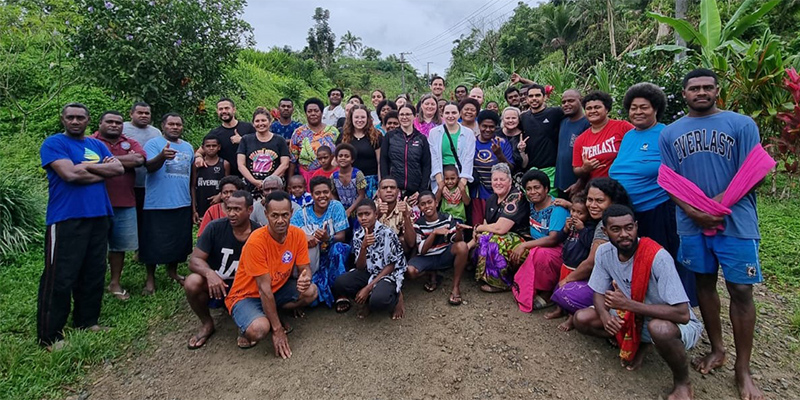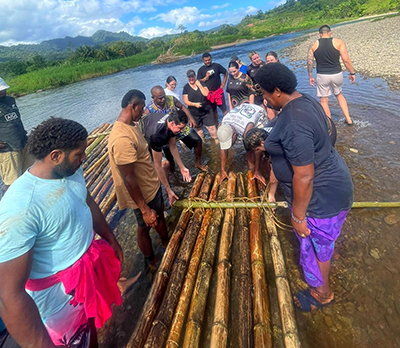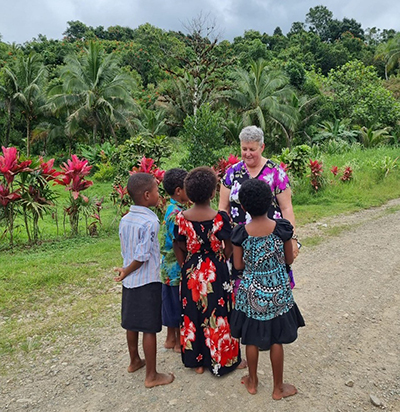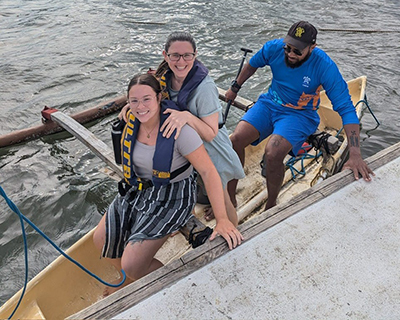When First Nations students exchange culture with First Nations peoples abroad: ‘Life-changing’
By Malvika Hemanth
 COMMUNITY
COMMUNITYA group of UniSA Aboriginal students have had their worldviews and ties to sacred culture enriched through the University’s inaugural First Nations International Study Tour.
 Students taking part in traditional Pacific Islander voyaging culture.
Students taking part in traditional Pacific Islander voyaging culture.The tour – which included Fiji’s capital, Suva; Nadi, on the island’s west; and the rural Nasevou Village, Naitasiri, located in the nature-rich southeast – saw 10 students along with four staff embrace the Fijian iTaukei way of life.
This cultural exchange included educational sessions at the University of the South Pacific, where students and staff were taught about Fijian history, language, art, culture and etiquette. Students and staff also experienced travel in a Uto ni Yalo, an age-old Polynesian sailing canoe, with the aim of reviving ancient voyaging traditions and advancing sustainable sea transportation, and engaged in leadership activities, helping Pacific Islander youth contextualise climate change to their surroundings.
 Kylie Cook with Fijian youth in the rural Nasevou Village, Naitasiri, located in the country’s southeast.
Kylie Cook with Fijian youth in the rural Nasevou Village, Naitasiri, located in the country’s southeast.For Makayla Moseley-Greatwich and Kylie Cook, both proud Ngarrindjeri women studying Social Work, the tour broadened their understandings of child protection laws, highlighting the importance of nurturing communities.
“The cultural shock on the first day was intense, but by day two, I had adjusted and truly enjoyed my time there. It was amazing,” Makayla says.
“I learned that having limited resources doesn’t equate to being unfit parents. The children thrived emotionally in a supportive community, reinforcing my belief in advocating for children’s rights.”
Ancient culture empowers students
Similarly, Kylie says the experience was life-changing, allowing her the space to reflect on the adage, 'it takes a village to raise a child.’
“The tour helped me understand that simple living is ok and that the support, love and togetherness of close-knit families and communities are critical,” she says.
 Makayla Moseley-Greatwich (front) and Shelyn Wilkinson (back) eager to visit a Uto ni Yalo, a traditional Polynesian sailing vessel.
Makayla Moseley-Greatwich (front) and Shelyn Wilkinson (back) eager to visit a Uto ni Yalo, a traditional Polynesian sailing vessel.For Shelyn Wilkinson, who has paternal ties to Barkindji country and is studying a double degree in Laws (Honours) and Psychology (Counselling and Interpersonal Skills), it was inspiring to witness native Pacific Islanders practice their culture.
“A major highlight was the voyage tour in Suva,” Shelyn says. “We had to use a traditional canoe to be ferried from shore to the anchored vessel. They (Fijian locals) had recently been from Fiji to Tonga and back. During that journey they navigated with no modern technologies and used the original equipment that their ancestors would have used.”
Tour aids career goals
Makayla, who hopes to one day work in child protection, says living within a rural Fijian village has equipped her with the cultural intelligence required to flourish in her future career.
“Witnessing families in the village who had so little, yet radiated happiness and contentment, was incredibly humbling. It allowed me to appreciate different perspectives and the importance of empathy in effective communication.”
Similarly, Shelyn, who aspires to become a criminal justice lawyer, says the tour has enhanced her communication and leadership skills through having to navigate interactions where residents had limited English speaking abilities.
“We had to learn to rely on body language and social cues. We collectively developed our teamwork and empowered youth leaders within the village to tease out goals for themselves and their village for future growth,” she says.
“This tour has helped strengthen my understanding about Fijian culture and the challenges a community in a remote area is faced with.”
New Zealand and Japan potential options for future tours
Kylie encourages other Aboriginal students to seize the opportunity to take part in international study tours for the immense benefits they can bring.
“Don't hesitate to take the chance. Go in with an open mind and understand the differences between our cultures. Most importantly, immerse yourself fully, even if it is uncomfortable.”
The tour has aided Fiji’s Ministry of iTaukei Affairs goal of preserving the Pacific nation’s oral-based culture by stimulating engagement and communicating knowledge about Fijian customs.
A first of many tours to come, UniSA International and Wirringka Student Services, which organised the 2024 tour, are exploring options for other host countries with possibilities for engagement with first nations communities in New Zealand, Canada and Japan. There is also future potential to have the program repeated in Fiji.
Student participation in the tour was made possible by the Australian Federal Government’s Indigenous Student Success Program and UniSA’s International Development Fund.

Other Stories
- New lunar distress system could safeguard future astronauts
- When a child hurts, validating their pain may be the best first aid
- Is chocolate milk a good recovery drink after a workout? A dietitian reviews the evidence
- When First Nations students exchange culture with First Nations peoples abroad: ‘Life-changing’
- From the Vice Chancellor: Balancing rights and responsibilities
- Achievements and Announcements
- Ageing fabulously: 3MT on a winner for the LGBTI+ older community
- UniSA international students win prized internships with Adelaide Football Club
- In Pictures: September graduation ceremonies
- The latest books from UniSA researchers




